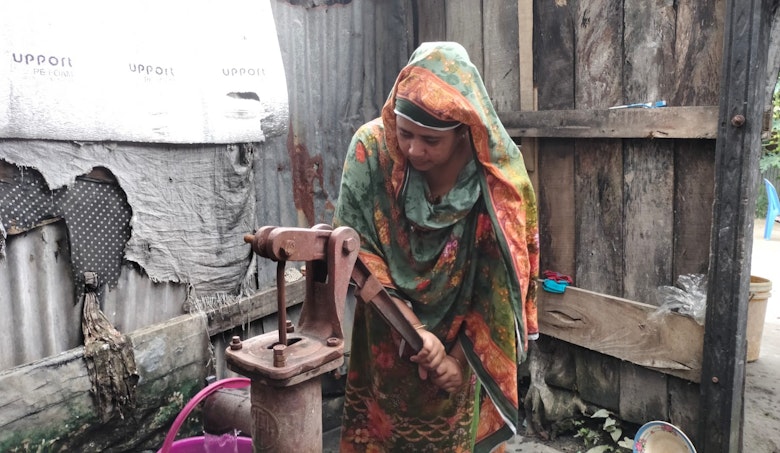How Aisha and her Family Received a Second Chance
As defined by the OHCHR, trafficking in persons refers to the recruitment, transportation, transfer, harbouring or receipt of persons—by force, coercion, fraud or some other form of deception—for the purpose of exploitation.
The population of Bangladesh is very vulnerable to this because of various reasons: geographical location, limited available jobs, poverty and ultimately vulnerability.
This is the story of Aisha, a bengali woman who was deceived, trafficked and exploited in Dubai. With the support of TdH NL, she has been able to overcome all of this hardship and she is now making enough money to support her family.
Aisha used to live with her children, her husband and her mother in law. Her husband was a shopkeeper, but he was also a gambler and a drug addict who abused Aisha. Due to her husband’s gambling, Aisha could not afford to send her children to school, and they would often go hungry as well.
Seeing no other options, Aisha moved back in with her father and took her children. She took up a job as a house cleaner for a while, but the low income still wasn’t enough to support her family and her children were malnourished.
Some people that had been to Dubai advised her to go there to earn a better salary, and one of her neighbours connected her to a broker. She had to pay the broker 1.5 lacs (around 1500 euro), and he helped her get a passport to go abroad. To afford this, Aisha had to mortgage her father’s property. She left for Dubai in October 2021.
Deceived
Once in Dubai, they took away her passport, and her employer gave her more work than what the contract stated. If she refused, they would threaten to not give the passport back. She was also not allowed to contact her family or the recruitment agency, and after 4 months, they stopped paying her completely. She felt scared and trapped. When she was finally able to go home to Bangladesh in May 2022, she was paid a lot less than what she was owed.
Recovery
In June 2022, with the help of a member of the Keraniganj Upazila Counter-Trafficking Committee, Aisha contacted the One-Stop Digital Service Centre. The Community Campaigner then went to her home to assess the situation. She immediately started receiving psychosocial and emotional support, and she was also referred to the training courses arranged by the BRAC migration programme. She chose to do one on cooking, and after 10 training sessions she started a food delivery service: she cooks food at her house and sells it to her neighbours and service holders. She does not have to do housework as a job anymore, and her daily income is BDT 500 (5 euro). Now she can afford to pay for her children’s education. She is also saving to pay off her loan and get back her father’s property.
Due to the emotional and psychosocial support, Aisha is slowly processing the trauma she suffered in the past few years. She and her family were also referred to a Probationary Officer at the District Social Welfare Office in Dhaka, so that they could have access to government welfare programmes.
“My day starts with preparing my son and daughter for school. I cook food for us. I love cooking what my children like. After they are off to school, I go shopping for groceries needed for my food deliveries. Gradually, people started to like my food. My sales have been increasing. Feeding people gives me pleasure. I spend evenings socialising with my neighbourhood. I also disseminate information and knowledge on safe migration to those who aspire to migrate. As I am a victim of trafficking, I do not want others to have the same fate as me,” explained Aisha.
Follow up
Thanks to all of the support, even though Aisha returned home with a broken heart, she is now a resilient and independent woman who is able to support her family. Her monthly income is BDT 15000 (160 euro). INCIDIN Bangladesh (the Trafficking in Persons project implementing partner) is regularly following her up on her situation and they still provide her with psychosocial counselling.
In the future, Aisha says she wants her children to receive higher education, and she wishes to open her own restaurant. In addition, she wants to raise community awareness on safe migration so that none ever becomes a victim of trafficking like her.

